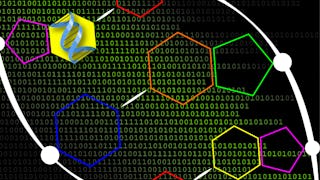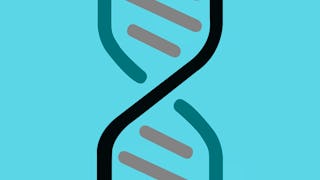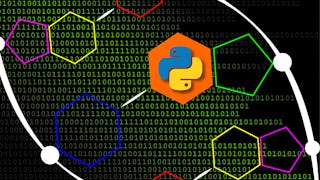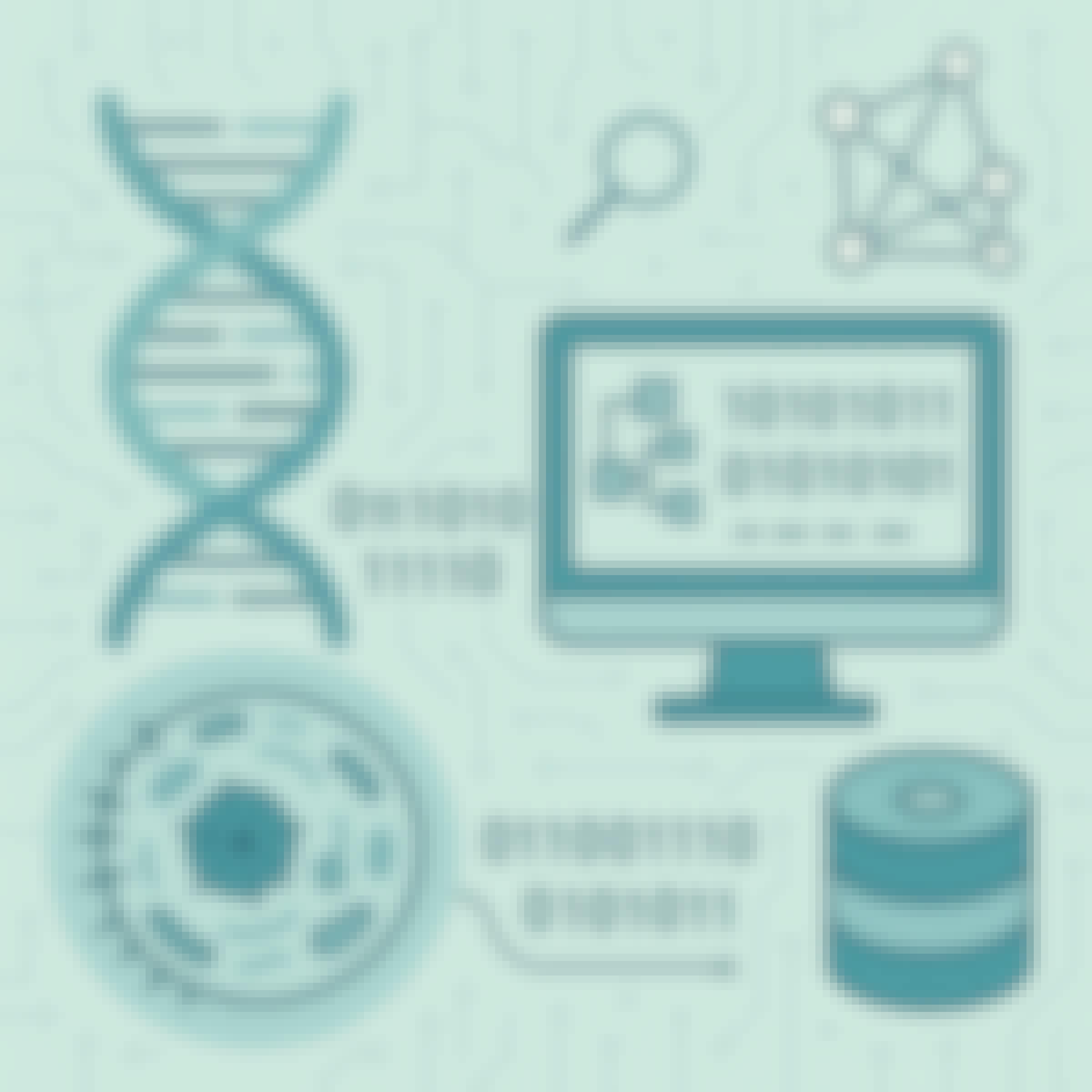- Browse
- Genomics
Genomics Courses
Genomics courses can help you learn DNA sequencing techniques, gene editing methods, and the principles of genetic variation. You can build skills in analyzing genomic data, understanding gene expression, and applying bioinformatics tools to interpret results. Many courses introduce software like BLAST for sequence alignment and R for statistical analysis, demonstrating how these tools facilitate research in areas such as personalized medicine, agricultural biotechnology, and evolutionary biology.
Popular Genomics Courses and Certifications
 Status: Free TrialFree TrialJ
Status: Free TrialFree TrialJJohns Hopkins University
Skills you'll gain: Bioinformatics, Unix Commands, Biostatistics, Exploratory Data Analysis, Statistical Analysis, Unix, Data Science, Data Management, Statistical Methods, Command-Line Interface, Statistical Hypothesis Testing, Linux Commands, Data Analysis Software, Data Quality, Data Structures, Data Analysis, Computer Science, Molecular Biology, R Programming, Python Programming
4.5·Rating, 4.5 out of 5 stars6.8K reviewsIntermediate · Specialization · 3 - 6 Months
 Status: Free TrialFree TrialJ
Status: Free TrialFree TrialJJohns Hopkins University
Skills you'll gain: Bioinformatics, Data Science, Molecular Biology, Data Analysis, Computer Science, Statistical Analysis, Computational Thinking, Biostatistics, Statistics, Software Engineering, Algorithms, Biology
4.6·Rating, 4.6 out of 5 stars4.8K reviewsMixed · Course · 1 - 4 Weeks
 Status: PreviewPreviewU
Status: PreviewPreviewUUniversity of Illinois Urbana-Champaign
Skills you'll gain: Life Sciences, Molecular Biology, Biotechnology, Precision Medicine, Biology, Physiology, Sustainable Development, Environmental Science, Cell Biology, Microbiology, Biomedical Engineering, Research
4.6·Rating, 4.6 out of 5 stars330 reviewsBeginner · Course · 1 - 3 Months
 Status: Free TrialFree Trial
Status: Free TrialFree TrialSkills you'll gain: Pre-Clinical Development, Drug Interaction, Clinical Trials, Pharmacology, Drug Development, Pharmaceuticals, Patient Safety, Clinical Research, Competitive Intelligence, Safety Standards, Laboratory Testing, Biochemical Assays, Medication Administration, Pharmacotherapy, Pharmaceutical Terminology, Safety Assurance, Biotechnology, Biochemistry, Laboratory Research, Chemistry
4.8·Rating, 4.8 out of 5 stars274 reviewsIntermediate · Specialization · 3 - 6 Months
 Status: Free TrialFree TrialJ
Status: Free TrialFree TrialJJohns Hopkins University
Skills you'll gain: Bioinformatics, Data Structures, Jupyter, Python Programming, Programming Principles, Object Oriented Programming (OOP), File I/O, Computational Logic, Package and Software Management, Data Manipulation
4.3·Rating, 4.3 out of 5 stars1.8K reviewsMixed · Course · 1 - 4 Weeks
 Status: Free TrialFree TrialJ
Status: Free TrialFree TrialJJohns Hopkins University
Skills you'll gain: Oncology, Medical Imaging, Patient Education And Counseling, Diagnostic Radiology, Radiation Therapy, Molecular Biology, Diagnostic Tests, Clinical Trials, Pain Management, Preventative Care, Treatment Planning, Urology, Patient Treatment, Immunology, Epidemiology, Surgery, Cell Biology, Care Management, Biology, Pathology
4.8·Rating, 4.8 out of 5 stars9.9K reviewsBeginner · Specialization · 3 - 6 Months
What brings you to Coursera today?
 Status: PreviewPreviewB
Status: PreviewPreviewBBirla Institute of Technology & Science, Pilani
Skills you'll gain: Bioinformatics, Biotechnology, Data Management, Biostatistics, Data Mining, Applied Machine Learning, Unsupervised Learning, R Programming, Scientific Visualization, Data Preprocessing, Correlation Analysis, Chemical and Biomedical Engineering, Dimensionality Reduction, Computational Thinking, Markov Model, Algorithms
Beginner · Course · 1 - 3 Months
 Status: Free TrialFree TrialU
Status: Free TrialFree TrialUUniversity of California San Diego
Skills you'll gain: Bioinformatics, Molecular Biology, Dimensionality Reduction, Unsupervised Learning, Data Analysis, Markov Model, Network Analysis, Biochemistry, Biotechnology, Life Sciences, Infectious Diseases, Microbiology, Statistical Analysis, Biology, Algorithms, Data Preprocessing, Machine Learning, Data Analysis Software, Data Mapping, Python Programming
4.3·Rating, 4.3 out of 5 stars1.3K reviewsBeginner · Specialization · 3 - 6 Months
 Status: Free TrialFree TrialU
Status: Free TrialFree TrialUUniversity of Toronto
Skills you'll gain: Bioinformatics, Network Analysis, Biostatistics, Molecular Biology, Analysis, Data Visualization Software, Database Software, Health Informatics, Data Analysis, Data Synthesis, Life Sciences, Statistical Methods, Data Mining, Exploratory Data Analysis, Technical Communication, Unsupervised Learning, Data Processing, Tree Maps, Scientific Visualization, Databases
4.7·Rating, 4.7 out of 5 stars2.1K reviewsBeginner · Specialization · 3 - 6 Months
 Status: NewNewStatus: PreviewPreviewU
Status: NewNewStatus: PreviewPreviewUUniversity of Cambridge
Skills you'll gain: Criminal Investigation and Forensics, Investigation, Laboratory Testing, Statistical Analysis, Molecular Biology, Specimen Collection, Scientific Methods, Medical Science and Research, General Science and Research, Data Collection, Case Studies, Biology, Ethical Standards And Conduct
4.8·Rating, 4.8 out of 5 stars8 reviewsBeginner · Course · 1 - 3 Months
 Status: Free TrialFree TrialF
Status: Free TrialFree TrialFFred Hutchinson Cancer Center
Skills you'll gain: Bioinformatics, Molecular Biology, Data Processing, Data Analysis, Data Literacy, Exploratory Data Analysis, Laboratory Research, Metadata Management, Science and Research, R Programming, Spatial Data Analysis, Scientific Methods, Data Collection, Data Quality, Research, Quantitative Research, Informatics, Biology, Laboratory Techniques, Analysis
3.7·Rating, 3.7 out of 5 stars33 reviewsIntermediate · Specialization · 3 - 6 Months
 Status: Free TrialFree TrialU
Status: Free TrialFree TrialUUniversity of Colorado Boulder
Skills you'll gain: Biological Engineering, Markov Model, Molecular Biology, Biotechnology, Bioinformatics, Simulation and Simulation Software, Mathematical Modeling, Engineering Analysis, Mathematical Software, Electrical Engineering, Engineering Design Process, Simulations, Biochemistry, Computational Thinking, Failure Analysis, Differential Equations, Cell Biology, Hazard Analysis, Technical Design, Chemical Engineering
Build toward a degree
4.5·Rating, 4.5 out of 5 stars33 reviewsIntermediate · Specialization · 3 - 6 Months
What brings you to Coursera today?
In summary, here are 10 of our most popular genomics courses
- Genomic Data Science: Johns Hopkins University
- Introduction to Genomic Technologies: Johns Hopkins University
- Genomics: Decoding the Universal Language of Life: University of Illinois Urbana-Champaign
- Drug Hunting: The Science of Making New Medicines: Novartis
- Python for Genomic Data Science: Johns Hopkins University
- Cancer Biology: Johns Hopkins University
- Introduction to Bioinformatics: Birla Institute of Technology & Science, Pilani
- Bioinformatics: University of California San Diego
- Plant Bioinformatic Methods: University of Toronto
- Forensic Science: DNA Analysis: University of Cambridge
Frequently Asked Questions about Genomics
Genomics is the study of genomes, the complete set of DNA within an organism, including all of its genes. This field is crucial because it helps us understand the genetic basis of diseases, the role of genetics in health, and the potential for personalized medicine. By analyzing genomic data, researchers can identify genetic variations that contribute to health conditions, paving the way for targeted therapies and improved healthcare outcomes.
A variety of career opportunities exist in genomics, reflecting its interdisciplinary nature. Potential job roles include genomic data analyst, bioinformatician, genetic counselor, and laboratory technician. Additionally, positions in research, healthcare, and biotechnology companies are common. As the field continues to grow, roles related to genomic research and personalized medicine are increasingly in demand.
To thrive in genomics, you should develop a strong foundation in biology, genetics, and bioinformatics. Key skills include proficiency in data analysis, familiarity with genomic technologies, and programming skills, particularly in languages like Python. Understanding statistical methods and data visualization techniques is also beneficial, as these skills help interpret complex genomic data effectively.
There are several excellent online courses available for those interested in genomics. For beginners, Introduction to Genomic Technologies provides a solid foundation. For those looking to enhance their programming skills in this field, Python for Genomic Data Science is a great choice. Additionally, Genomics: Decoding the Universal Language of Life offers insights into the broader implications of genomic research.
Yes. You can start learning genomics on Coursera for free in two ways:
- Preview the first module of many genomics courses at no cost. This includes video lessons, readings, graded assignments, and Coursera Coach (where available).
- Start a 7-day free trial for Specializations or Coursera Plus. This gives you full access to all course content across eligible programs within the timeframe of your trial.
If you want to keep learning, earn a certificate in genomics, or unlock full course access after the preview or trial, you can upgrade or apply for financial aid.
To learn genomics effectively, start by exploring introductory courses that cover the basics of genetics and genomic technologies. Engage with hands-on projects and exercises to apply what you learn. Additionally, consider joining online forums or study groups to connect with others in the field, which can enhance your understanding and provide support.
Typical topics covered in genomics courses include DNA sequencing, gene expression analysis, genetic variation, and bioinformatics tools. Courses often explore the ethical implications of genomic research and its applications in medicine, agriculture, and biotechnology. Understanding these topics is essential for anyone looking to work in the field of genomics.
For training and upskilling employees in genomics, courses like Statistics for Genomic Data Science can be particularly beneficial. This course equips learners with the statistical tools needed to analyze genomic data effectively. Additionally, organizations may consider offering a combination of courses that cover both the technical and ethical aspects of genomics to ensure a well-rounded understanding.










